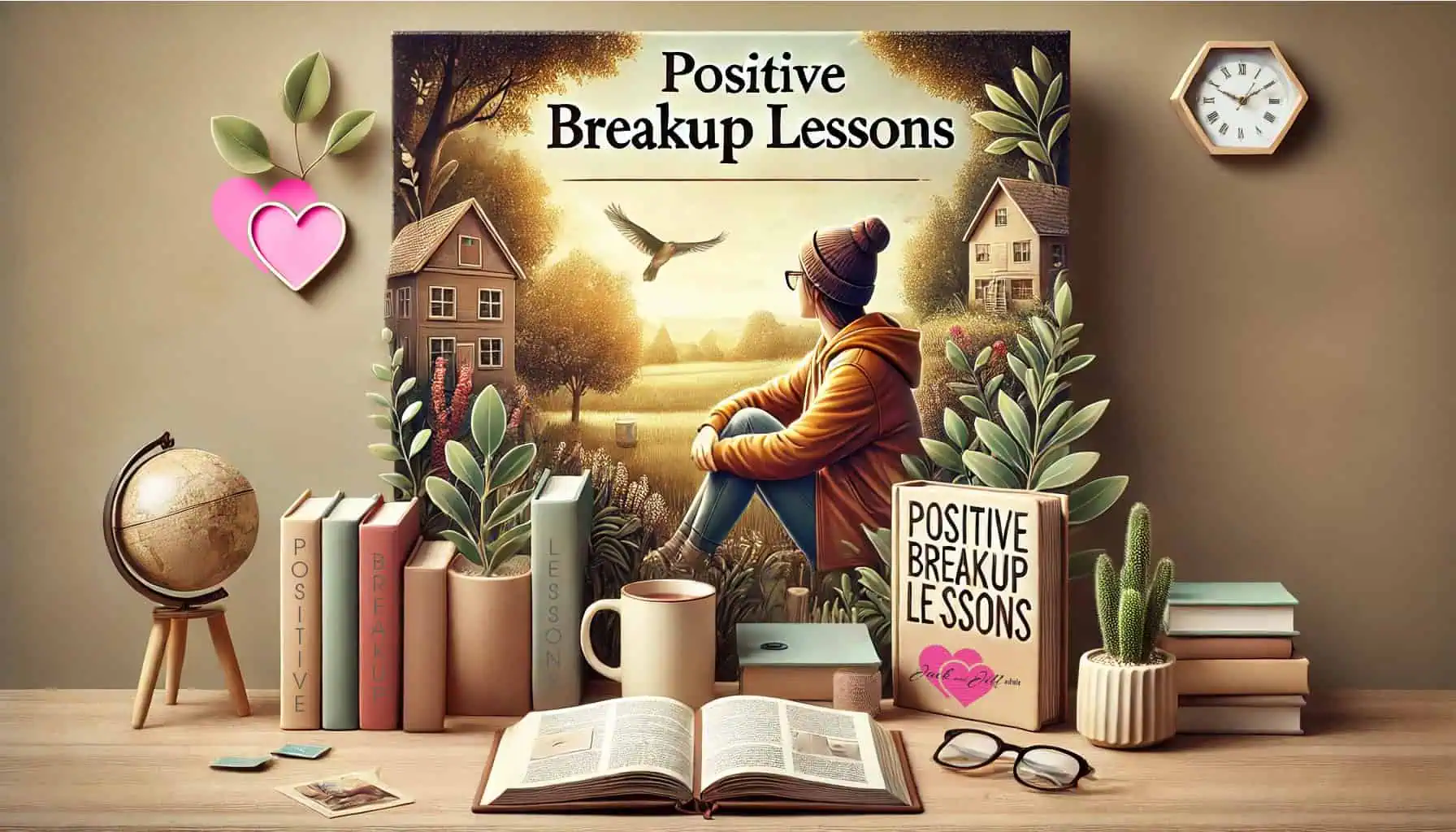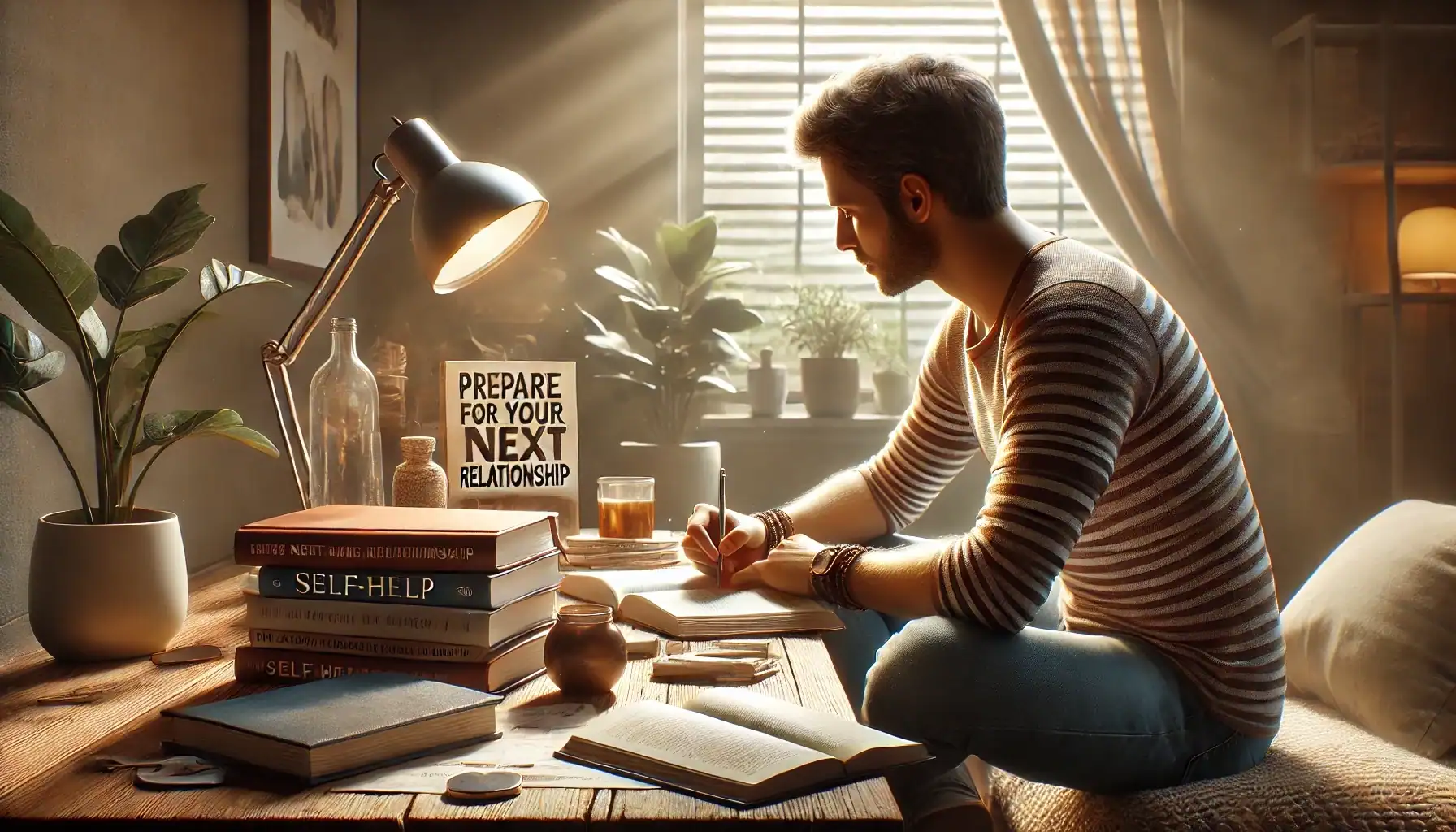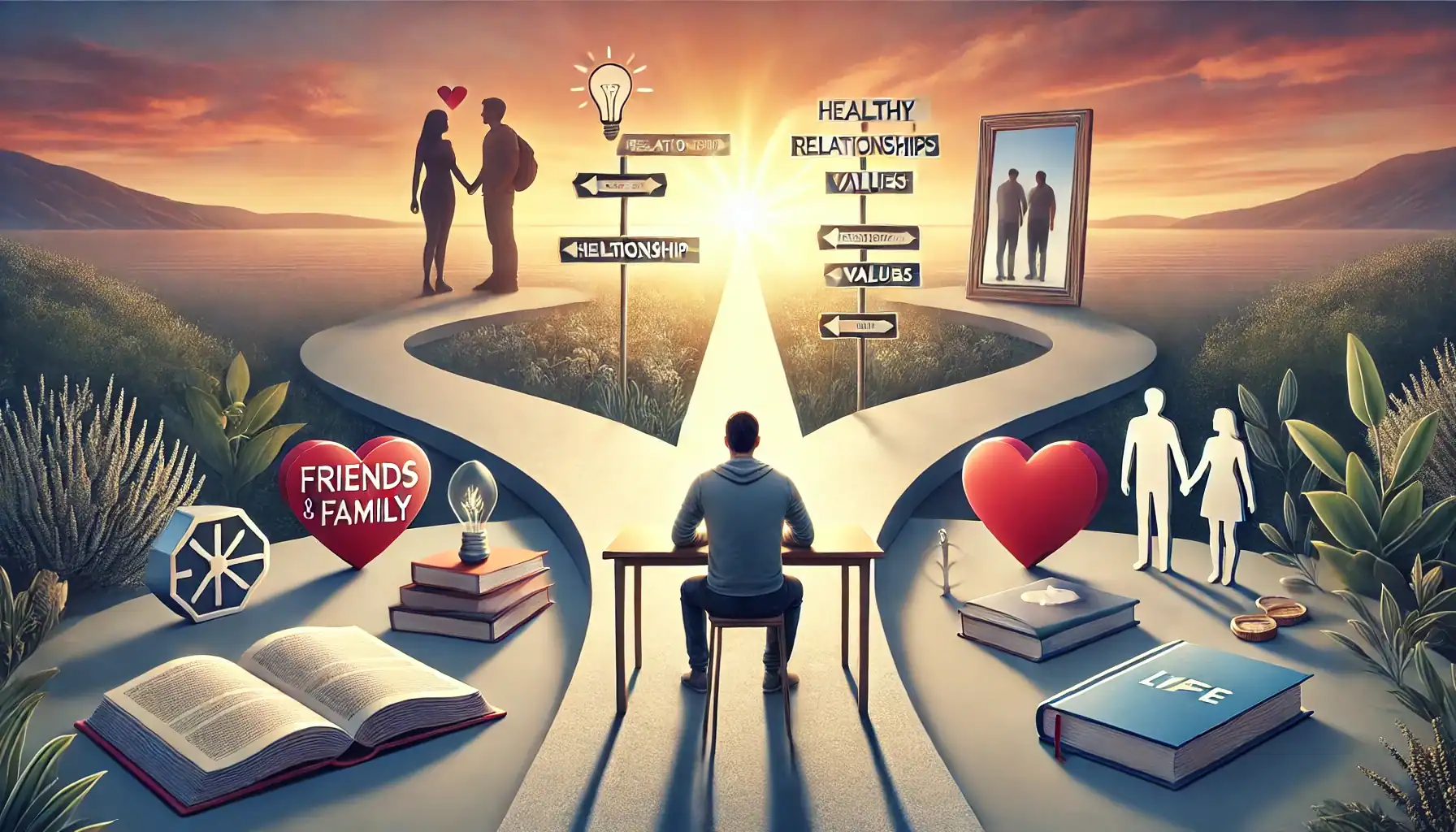
Positive Breakup Lessons
Breaking up is never easy. Maybe you didn’t see it coming, and the other person suddenly wants out. This abrupt end can leave you feeling blindsided and confused. When a relationship ends, it often feels like the rug has been pulled out from under you. The sense of stability and predictability is shattered, and you are left to pick up the pieces. Whether it’s a mutual decision or a sudden change, the end of a relationship brings a whirlwind of emotions. Shock, sadness, anger, and even relief are common feelings that can emerge in the aftermath. In this blog we will be discussing Positive Breakup Lessons.
Despite the emotional upheaval, finding positive lessons amid the turmoil is possible. The pain and confusion of a breakup can be an influential teacher, guiding you toward greater self-awareness and understanding. This period of introspection allows you to reflect on what went wrong and what you can learn from the experience. By focusing on personal growth, you can see the breakup as not an end but a new beginning. This mindset shift is crucial in transforming heartache into a powerful catalyst for a better future and achieving emotional closure.
Emotional resilience plays a crucial role in this process, helping individuals to navigate their feelings and emerge stronger. Building resilience involves acknowledging your pain and permitting yourself to grieve. It also means finding healthy coping methods, such as talking to friends, engaging in hobbies, or seeking professional support. Over time, these efforts help you to rebuild your sense of self and prepare for future challenges. As you grow stronger, you’ll find that the experience has made you more resilient,
Recognizing the Wake-Up Call

A breakup often serves as a wake-up call, prompting us to reevaluate our lives and relationships. It’s a moment to reflect on what went wrong and what can be learned from the experience. Recognizing this warning is the first step towards healing and moving forward. Often, a relationship’s sudden and painful end can be a profound catalyst for change, encouraging you to reassess your priorities and goals through self-discovery.
One of the most significant lessons from a breakup is embracing your happiness. When a relationship ends, it’s easy to feel like you’ve lost your only person. Still, this is an opportunity to rediscover what makes you happy independently of your partner or anyone else. Personal happiness is crucial, and this period allows you to focus on your own needs and desires without the influence of an ex or a partner.
Breakups can be a profound catalyst for personal growth. The end of a past relationship allows you to focus on yourself and your needs, leading to a deeper understanding of who you are and what you want. Growth from break up often involves exploring new interests, developing new skills, and strengthening your self-worth. Emotional resilience is essential in this journey, enabling you to
Practicing Self-Compassion

Emotional intelligence is essential during the healing process. It plays a crucial role in practicing self-compassion and understanding one’s emotions. Be kind to yourself, recognize and accept that it’s okay to feel hurt, and take the time you need to heal. Self-compassion involves acknowledging your feelings without judgment and treating yourself with the same kindness and understanding that you would offer a friend.
Failed relationships are not just about loss; they are also about learning. Each relationship we break up teaches us something valuable about ourselves and what we need in a partner. Reflecting on past relationships of failure can provide insights into patterns and behaviors that may need to be addressed to improve future relationships.
Prioritizing Mental Health

It’s essential to prioritize your emotional well-being during a breakup. This might involve seeking therapy or counseling to process your emotions, develop healthy coping mechanisms, and establish self-care routines. Mental health professionals can provide the tools and support needed to navigate the emotional complexities of a breakup.
A breakup can inspire a commitment of free will to self-improvement. Whether focusing on fitness, learning a new skill, or pursuing a passion, this free time can be used to better yourself. Self-improvement enhances your well-being and boosts your confidence and sense of accomplishment.
Breakups often bring difficult emotions to the surface. Acknowledging and processing these feelings is crucial for healing. Not everyone handles emotions the same way, and that’s okay. Finding healthy ways to express and manage feelings, such as journaling, talking to friends, or engaging in creative activities, can facilitate healing.
Breakups provide a chance to reaffirm your core values. Understanding what is truly important to you can guide you in future relationships and life decisions. Clarifying your core values also helps you make choices aligned with your true self and seek partners with similar values.
Preparing for the Next Relationship

Learning from a breakup and addressing emotional baggage is essential for preparing for future relationships. Understanding your emotional needs and boundaries can help you build healthier, more fulfilling connections. Everyone must realize and apply the lessons learned to create a stronger foundation for future partnerships. This process involves self-reflection, recognizing patterns, and consciously improving personal well-being. Individuals can approach new relationships with greater confidence and emotional resilience, ensuring a more positive and supportive dynamic with future partners.
Understanding why relationships end is essential. This insight can prevent repeating the same mistakes and help you choose partners who align better with your values and goals in dating again. Reflecting on the reasons for the breakup provides clarity and enables you to make more informed dating decisions in the future.
Reflecting on dating your ex-partner and the relationship dynamics can provide valuable lessons. It’s not about blame but understanding what worked and what didn’t. This honest reflection can offer closure and help you to identify what you truly need in a partner.
Supportive Friends and Family

A social support network of supportive friends and family becomes crucial during a breakup. They provide the emotional support needed to navigate complex emotions and help you see the positive aspects of your situation. Leaning on a supportive network can make the transition smoother and less isolating. Friends play a vital role in the healing process. They provide comfort, distraction, and a sense of normalcy as you navigate this transition. Spending time with friends can help you to feel supported and less isolated.
A best friend can be a lifeline during a breakup. They offer a listening ear, practical advice, and a reminder that you are valued and loved. The support of a best friend can make the healing process less lonely and more manageable.
Family support can be invaluable during a breakup. They offer a stable foundation and unconditional love to help you through the most challenging times. Lean on your family for emotional support and guidance.
The Impact on Your Life

Breakups impact various aspects of your life, from your daily routine to your long-term plans. A breakup can be seen as a ‘life transition’ that leads to new opportunities and growth. Embracing these changes can lead to new opportunities and growth. Viewing the breakup as a chance to redefine and reshape the rest of your life in a way that aligns with your goals and aspirations is essential.
Rebuilding self-worth is a crucial part of healing from a breakup. Recognize your strengths and achievements, and remember that a relationship does not define your value. Building self-worth involves focusing on your positive qualities and accomplishments.
Navigating the range of feelings and emotions after a breakup is challenging. Allow yourself to feel and express these emotions through talking, journaling, or creative outlets. Processing your emotions is essential for healing and moving forward.
Social media can complicate the healing process. Taking a break from it is often helpful to avoid remembering the past relationship and focus your energy on recovery. Limiting social media use can help you to heal, prevent unnecessary comparisons, and maintain a healthier mindset.
Moving On from the Partner
Moving on from your ex-partner takes time, effort, and emotional healing. Focus on your future and the new possibilities that lie ahead. It’s essential to shift your attention from the past to the opportunities and experiences that await you.
Envisioning a bright outlook can be incredibly motivating. Set new goals and dreams that are independent of the previous relationship. Visualizing a positive future can inspire hope and a sense of purpose.
Embracing the idea of a breakup means accepting it as a part of your journey. It’s a chance to redefine yourself and your path in life. Viewing a breakup as an opportunity for growth can help you move forward with a positive outlook.
Coping strategies are essential for managing the pain of a breakup. Find healthy ways to deal with your emotions and stress. This might include physical activity, hobbies, or spending time in nature.
Seize the moment to forget the breakup, rediscover yourself, and explore the world with new interests. This can lead to growth and new passions. Embracing new experiences can help you move forward and find joy.
Every breakup offers lessons. Reflect on these lessons to better understand yourself and your relationship patterns. Applying these lessons can help you to build healthier relationships in the days ahead.
A breakup can inspire new ideas and perspectives on life and relationships. Embrace this opportunity for creativity and exploration, and open your mind to new possibilities and ways of thinking.
What Really Matters

Breakups clarify what matters to you, relationships, and personal values. Use this insight to guide your future choices. Focus on the values and goals that are most important to you.
Talking about your feelings can be incredibly healing. Whether you speak with friends, family, or a therapist, expressing your emotions helps process them. Communication is a vital part of healing and moving forward.
Happiness is not lost forever after a breakup. It can be rediscovered through new experiences, relationships, and growth. Focus the first time on the activities and people that bring you joy.
Developing a solid sense of self is critical to moving your life forward. Know who you are and what you stand for. This sense of identity will guide you in prospective relationships and life decisions.
Hold on to hope for the future. Believe that better days are ahead and that you, in person, will finally find your happiness and fulfillment. Maintaining hope is crucial for staying positive and motivated.
Rebuilding Lives
New beginnings after a breakup involve creating new routines, goals, and dreams. Embrace this process with optimism. Use this time to build a life that reflects your true self and acceptance of the past. A breakup can also lead to new beginnings and opportunities for growth.
Painful emotions are a natural part of breakups. Find healthy ways to manage and express these feelings. This might include talking to a friend, journaling, or engaging in physical activity.
Acceptance is a significant part of moving on. Accept what has happened and look forward to the future. Embrace the changes and use them as a foundation for growth.
Healing takes time, but it’s possible. Focus on activities and practices that promote healing and well-being. This might include self-care, therapy, or spending time with loved ones.
The Role of Important Support

Emotional support from friends and family is crucial during a breakup. Leaning on them for help and encouragement can significantly ease the healing process. The presence of a supportive network provides a sense of stability and reassurance that you are not alone. Friends and family can offer a listening ear, practical advice, and a comforting presence, which are invaluable during emotional distress. Their support helps mitigate feelings of isolation and loneliness that often accompany the end of a relationship.
Friends can play a unique role in the healing journey. They often understand you the best, knowing when to offer a distraction and when to listen. Spending time with friends can be a great way to regain a sense of normalcy and joy. Activities like going out for coffee, watching a movie, or engaging in shared hobbies can provide much-needed relief from the emotional turmoil. Friends can also offer different perspectives on the breakup, helping you to see the situation more clearly and positively.
Family support is equally important, offering a stable foundation and unconditional love. Family members often understand your history more deeply and can provide wisdom and insights based on long-term observations. They can remind you of your strengths and previous successes, reinforcing your self-worth. Leaning on family for emotional support can also mean involving them in your healing activities, such as family dinners, trips, or simply spending quality time together. Their consistent presence can be a comforting reminder that you are valued and loved.
Professional support, such as therapy or counseling, should not be overlooked. A mental health professional can provide a safe space to express your feelings and work through complex emotions. Therapy offers tools and techniques for coping with the breakup, managing stress, and building resilience. It also allows for deeper self-exploration and understanding, which can be pivotal in personal growth. Engaging with a therapist can complement the support from friends and family, providing a well-rounded approach to healing.
Support groups can also be beneficial. Joining a group of individuals going through similar experiences can provide a sense of community and shared understanding. Support groups offer a platform to share stories, exchange advice, and learn from others’ coping strategies. This collective experience can be incredibly validating and comforting, reinforcing that you are not alone in your struggles. The encouragement and empathy from group members can significantly boost your morale and aid in the healing process.
In conclusion, leaning on friends, family, and professional support systems is crucial during a breakup. Their help and encouragement make the healing process less daunting and more manageable. By surrounding yourself with a supportive network, you create an environment where you can express your feelings, gain valuable insights, heal, and find the strength to move forward. Remember, seeking help and relying on others during this challenging time is okay. Their support is beneficial and essential for your emotional recovery and growth.
Eventually Finding Peace

Eventually, peace will come after a breakup with emotional closure. It takes time, but moving forward with effort and emotional closure is possible. The healing process is unique for everyone, and giving yourself the time needed to grieve and process the loss is essential. Accepting that it’s okay to feel a range of emotions is a critical step in finding peace. Allow yourself to experience sadness, anger, and even relief without judgment. These feelings are natural and part of the journey toward emotional recovery.
One way to find peace is to create new routines and establish a sense of normalcy. Engaging in activities you enjoy and setting small, achievable goals can provide a sense of purpose and direction. This can be as simple as taking up a new hobby, exercising regularly, or spending more time with friends and family. These new routines distract from the pain and help rebuild your identity and self-worth outside the relationship.
Another vital aspect is self-reflection and understanding the lessons learned from the breakup. Reflecting on what happened, what went wrong, and what could be done differently in the future relationship can provide valuable insights. This self-awareness can prevent repeating the same mistakes in future relationships and help you better understand your needs and boundaries. It’s a time to grow and become a better version of yourself, ultimately contributing to inner peace.
Seeking support from friends, family, or a therapist can facilitate healing. Talking about your feelings and experiences can be incredibly therapeutic. It helps to know that you are not alone and that others have gone through similar experiences. A supportive network can provide encouragement, advice, and a different perspective to help you see things more clearly and positively.
Finally, focusing on the days ahead and setting new personal goals can be a powerful way to find peace. Envisioning a future where you are happy and fulfilled, independent of the past relationship, can be motivating. Whether pursuing a new career, traveling the world, or simply working on improving oneself, having something to look forward to can shift your focus from the past to the possibilities ahead. With time, effort, and a positive outlook, peace will come, and you will find yourself more robust and resilient.

